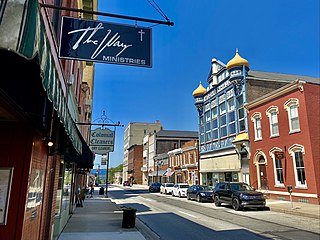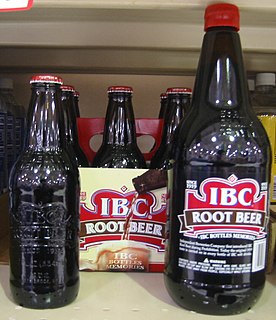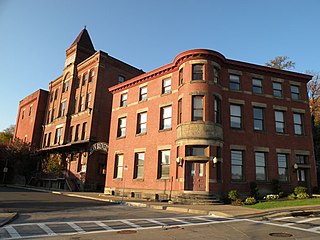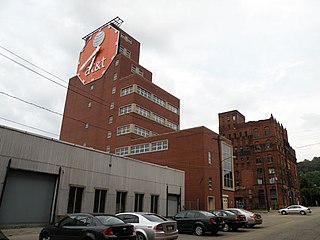
Latrobe is a city in Westmoreland County, Pennsylvania, in the United States and part of the Pittsburgh metropolitan area.

The Coors Brewing Company started as an American brewery and beer company in Golden, Colorado. In 2005, Adolph Coors Company, the holding company that owned Coors Brewing, merged with Molson, Inc. to become Molson Coors.

IBC Root Beer is an American brand of root beer now owned by Keurig Dr Pepper. It was originally owned by IBC until it went out of business.

The Iron City Brewing Company is a beer company that until August 2009 was located in the Lawrenceville neighborhood of Pittsburgh, Pennsylvania, United States. On June 11, 2009, it was reported that the brewery was moving their production to Latrobe, Pennsylvania. That move was completed and Iron City is now produced in the former Latrobe Brewery that was once used to produce Rolling Rock.

Latrobe Brewing Company was founded in 1893 in Latrobe, Pennsylvania as part of the Pittsburgh Brewing Company. Forced to close in 1920 due to prohibition, it was purchased by the Tito brothers and reopened in 1933 selling “Latrobe Old German” and “Latrobe Pilsner” beers. The year 1939 saw the introduction of Rolling Rock beer and Latrobe became one of the largest breweries in the United States. It was purchased by Labatt Brewing Company in 1987, which in turn was purchased in 1995 by the Belgian brewing conglomerate corporation Interbrew, which merged later into InBev in 2004.
City Brewing Company is a large brewery located in La Crosse, Wisconsin, USA. It also goes by the trade name of City Brewery.

Penn Brewery, also known as the Pennsylvania Brewing Company, is a brewery and restaurant in Pittsburgh, Pennsylvania. It was founded by Tom Pastorius in 1986, and is located at 800 Vinial Street in the Troy Hill neighborhood of Pittsburgh, on the site of the former Eberhardt and Ober Brewery.

Lion Brewery, Inc, is the operator of the Lion Brewery, located in Wilkes-Barre, Pennsylvania, which was founded in 1905. A "heritage brewery", it is one of only 10 United States pre-Prohibition breweries that has independently and continuously operated since the repeal of Prohibition. It produces beers under its own Lionshead brand, and contract brews beer for other companies.
The International Union of United Brewery, Flour, Cereal, Soft Drink and Distillery Workers was a labor union in the United States. The union merged with the Teamsters in 1973.
Griesedieck Brothers Beer is a historic St. Louis beer brand that has been reintroduced after years of absence. The Griesedieck family once owned three St. Louis-area breweries, Griesedieck Brothers Brewery, Griesedieck Western Brewery Co. in Belleville, Illinois and the Falstaff Brewing Corporation, producer of Falstaff Beer.

The National Brewing Company was an American brewing company that was founded in Baltimore, Maryland, in 1885. Its Baltimore brewery was located in the city's Highlandtown neighborhood. After World War II, it grew to be the largest brewer in Baltimore history and its advertising, including one-eyed mascot "Mr. Boh" and its slogan "From the Land of Pleasant Living", became part of the folk culture of the Baltimore area.
The Fred Krug Brewery was located at 2435 Deer Park Boulevard in Omaha, Nebraska. Founded in 1859, Krug Brewery was the first brewery in the city. Krug was one of the "Big 4" brewers located in Omaha, which also included the Storz, Willow Springs and Metz breweries. Later sold to Falstaff in 1936, the facility closed in 1987.

The Duquesne Brewing Company was a major brewery in Pittsburgh, Pennsylvania, from its founding in 1899 until its dissolution in 1972. The brand was revived under the name Duquesne Brewing Company in 2008, in order to re-establish the beer in Western Pennsylvania starting in the summer of 2010.

Located on the Duquesne Brewing Company building in Pittsburgh, Pennsylvania, the Duquesne Brewery Clock was the largest single-face clock in the world when it was installed in 1933. Over the years its face has been used to advertise numerous brands, beginning with Coca-Cola.

The Christian Schmidt Brewing Company was an American brewing company headquartered in Philadelphia, Pennsylvania. Founded in 1860, it was the largest brewing company in the history of Philadelphia, producing nearly 4,000,000 barrels of beer a year in the late 1970s. When it closed in 1987, it marked the first time in over 300 years that there was no brewery operating in Philadelphia.
Fort Pitt Brewing Company was a major brewery in Pittsburgh, Pennsylvania, from 1906-1957, which brewed Fort Pitt Beer and other regional brands. Mark Dudash, a Pittsburgh area attorney and owner of Duquesne Brewing Company, revived Fort Pitt Brewing, and introduced a new Fort Pitt Ale in 2014. The new Fort Pitt Ale is crafted in the spirit of the brewery established in Fort Pitt in 1765, and is formulated as an ale using two row malt, caramel, and English hops. The company had manufacturing plants in Sharpsburg, Pennsylvania and Jeannette, Pennsylvania.

Milwaukee, Wisconsin, has one major brewery and dozens of microbreweries, and is home to several iconic beer brands from a variety of brewers. It has had an association with beer throughout its history, with the brewing industry getting its start prior to its official founding as a city and was nationally recognized as such by the end of the 19th century. This heritage can be found explicitly in its Major League Baseball team, the Milwaukee Brewers, and on recognizable beer brands such as Old Milwaukee and Milwaukee's Best. This recognition of Milwaukee as a brewing hub dates back to the early 20th century, and boasted the world's largest brewing capacity as late as 1981. The city is nationally recognized with the nickname "Brew City" due to its nearly two centuries of brewing heritage from multiple past major brewers including Miller Brewing Company, Pabst Brewing Company, and Joseph Schlitz Brewing Company. Today, through the ownership of MillerCoors, the city's largest brewery produces 10 million barrels of beer annually.
Indianapolis Brewing Company (IBC) was a brewery in Indianapolis, Indiana in the United States. The brewery opened in 1887 and closed in 1948. During its existence, it won medals at the 1900 Paris Exposition and the St. Louis World’s Fair. The brewery operated during Prohibition, producing tonic and malt extract.
The city of Rochester, New York—before being known as the birthplace of Kodak, Xerox, and Bausch & Lomb—was internationally known for its robust brewing industry. Indeed, the city was uniquely positioned for such an industry in the early 19th century. The corn, rye, barley, wheat, and other grains grown in the Genesee River Valley were shipped down river to be milled in such quantity that by 1838 Rochester was world's largest flour producer, earning it the nickname the Flour City.












